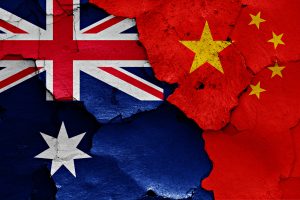One of the narratives that emerged from the recent G-20 Summit in Bali, Indonesia, was that by securing a face-to-face meeting with Chinese President Xi Jinping, Australia’s Prime Minister Anthony Albanese had demonstrated the success of Australia’s unsubmissive approach to China. By refusing to bow to China’s belligerence and economic coercion, Canberra has now earned Beijing’s respect, or at least the acknowledgment from China that its tactics won’t work. Rather than a single meeting, it will be sustained high-level engagement between Beijing and Canberra that will prove whether this is true or not.
Instead of predictions about how the relationship will evolve from here, what is of interest at the moment is the way Australia’s approach to China has been described over the past half-decade – with the often lazy commentariat resorting to terms like “hardline” and “hawkish.” These terms are worth prosecuting because they come with implications that sit uncomfortably with how countries like Australia should deal with an authoritarian superpower like China, and with what Australia’s foreign policy objectives actually are.
The term “hawkish” when used in foreign affairs tends to describe an aggressive or warlike posture. Despite the fantasies of some groups who claim to be advancing a more “peaceful” Australian foreign policy, it is very unlikely that Australia is seeking to induce a war in the Indo-Pacific region – or hope the United States will induce one either. As a country that is economically reliant on northeast Asia, any war over, say, Taiwan, would prove disastrous to Australia’s direct interests, as well as create an awful destabilization in the region with untold consequences (not to mention be horrific for a good friend in Taiwan).
What Australia instead seeks is the maintenance of regional stability. But stability relies on a collective sense of legitimacy, and not everyone agrees on what legitimacy is. Is legitimacy based simply on raw power, where “might makes right”? Or does it rely on a set of principles, institutions and rules that give countries – no matter what their strength – the ability to cooperate freely with one another? As a middle power Australia clearly favors the latter, but as an emerging authoritarian superpower, China favors the former – despite its current strength being owed to the very same cooperative international environment it chafes against.
In recent years China has targeted Australia in order to test how far it can push the current principles and rules of the international system. For the Chinese Communist Party (CCP) the world can be divided neatly into those who exercise power and the chumps who submit themselves to it. To see whether Australia was a chump China has used economic coercion, arbitrary detention, foreign interference operations, military intimidation and an extraordinary list of 14 grievances it expected the Australian government to placate.
Australia’s response to this has simply been a refusal to be cowed, instead maintaining a commitment to its values and interests, and to the principles and rules of the international system where bullying should, at least ideally, be unacceptable. To resist bullying is only “hawkish” if you sympathize with the bullies.
That said, Australia’s rhetoric hasn’t always been as restrained as this stoic strategy would suggest. Like the CCP itself, the former conservative Coalition government often used spirited rhetoric in order to appeal to its domestic audience. While this may often have been counterproductive, and occasionally played into the CCP’s hands in incredibly stupid ways, broadly, the substance has been to maintain stability by not rewarding – and therefore encouraging – domineering behavior.
The new Labor Party government has smoothed out some of the rougher edges of the previous government’s stance, but has maintained its unsubmissive manner. Sensing this is now Australia’s behavior regardless of who is in government, China looks to have relented, or at least decided Australia is now worthy of high-level meetings. The Australian government has welcomed this, making it clear that it will cooperate with China where it can, but disagree where it must.
This approach is based on a rational understanding of China’s power. Were Australia to take an entirely values-based position it would diplomatically recognize Taipei over Beijing. Not doing so acknowledges China’s power, but being unsubmissive to the excess of China’s authoritarianism seeks to shape China’s power in a more cooperative manner. Rather than “hardline” this demonstrates flexibility. Something we could even call “dovish” in that it seeks a positive relationship with a less belligerent China.
Being concerned with the way words are used is not just a matter of arguing over semantics. Terms like “hawkish” and “hardline” come with worldviews that need to be understood, rather than thrown around casually. It is also important to develop accurate representations of the behavior of states because we are currently in an era of linguistic smokescreens, where terminology is deployed to hide true intent. If legitimacy relies on trust, then trust relies on accuracy.

































